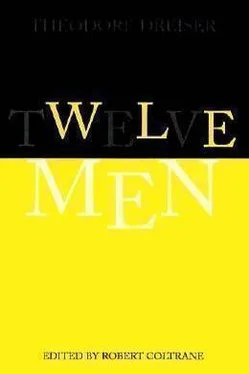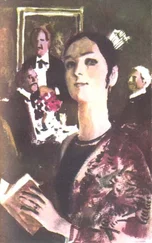Теодор Драйзер - Twelve Men
Здесь есть возможность читать онлайн «Теодор Драйзер - Twelve Men» весь текст электронной книги совершенно бесплатно (целиком полную версию без сокращений). В некоторых случаях можно слушать аудио, скачать через торрент в формате fb2 и присутствует краткое содержание. Год выпуска: 2014, Издательство: epubBooks Classics, Жанр: Биографии и Мемуары, на английском языке. Описание произведения, (предисловие) а так же отзывы посетителей доступны на портале библиотеки ЛибКат.
- Название:Twelve Men
- Автор:
- Издательство:epubBooks Classics
- Жанр:
- Год:2014
- ISBN:нет данных
- Рейтинг книги:4 / 5. Голосов: 1
-
Избранное:Добавить в избранное
- Отзывы:
-
Ваша оценка:
- 80
- 1
- 2
- 3
- 4
- 5
Twelve Men: краткое содержание, описание и аннотация
Предлагаем к чтению аннотацию, описание, краткое содержание или предисловие (зависит от того, что написал сам автор книги «Twelve Men»). Если вы не нашли необходимую информацию о книге — напишите в комментариях, мы постараемся отыскать её.
Twelve Men — читать онлайн бесплатно полную книгу (весь текст) целиком
Ниже представлен текст книги, разбитый по страницам. Система сохранения места последней прочитанной страницы, позволяет с удобством читать онлайн бесплатно книгу «Twelve Men», без необходимости каждый раз заново искать на чём Вы остановились. Поставьте закладку, и сможете в любой момент перейти на страницу, на которой закончили чтение.
Интервал:
Закладка:
"Well, what's the matter with you now?" It was Culhane, eyeing him most severely.
"I hef hurt my foot. I kent stay on."
"You mean you'd rather walk, do you, and lead your horse?"
"Vell, I kent ride."
"All right, then, you lead your horse back to the stable if you want any lunch, and hereafter you run with the baby–class on the short block until you think you can ride without falling off. What's the good of my keeping a stable of first–class horses at the service of a lot of mush–heads who don't even know how to use 'em? All they do is ruin 'em. In a week or two, after a good horse is put in the stable, he's not fit for a gentleman to ride. They pull and haul and kick and beat, when as a matter of fact the horse has a damned sight more sense than they have."
We rode off, leaving Itzky alone. The men on either side of me—we were riding three abreast—scoffed under their breath at the statement that we were furnished decent horses. "The nerve! This nag!" "This bag of bones!" "To think a thing like this should be called a horse!" But there were no outward murmurs and no particular sympathy for Mr. Itzky. He was a fat stuff, a sweat–shop manufacturer, they would bet; let him walk and sweat.
So much for sympathy in this gay realm where all were seeking to restore their own little bodies, whatever happened.
So many of these men varied so greatly in their looks, capacities and troubles that they were always amusing. Thus I recall one lean iron manufacturer, the millionaire president of a great "frog and switch" company, who had come on from Kansas City, troubled with anæmia, neurasthenia, "nervous derangement of the heart" and various other things. He was over fifty, very much concerned about himself, his family, his business, his friends; anxious to obtain the benefits of this celebrated course of which he had heard so much. Walking or running near me on his first day, he took occasion to make inquiries in regard to Culhane, the life here, and later on confidences as to his own condition. It appeared that his chief trouble was his heart, a kind of phantom disturbance which made him fear that he was about to drop dead and which came and went, leaving him uncertain as to whether he had it or not. On entering he had confided to Culhane the mysteries of his case, and the latter had examined him, pronouncing him ("Rather roughly," as he explained to me), quite fit to do "all the silly work he would have to do here."
Nevertheless while we were out on the short block his heart was hurting him. At the same time it had been made rather clear to him that if he wished to stay here he would have to fulfill all the obligations imposed. After a mile or two or three of quick walking and jogging he was saying to me, "You know, I'm not really sure that I can do this. It's very severe, more so than I thought. My heart is not doing very well. It feels very fluttery."
"But," I said, "if he told you you could stand it, you can, I'm sure. It's not very likely he'd say you could if you couldn't. He examined you, didn't he? I don't believe he'd deliberately put a strain on any one who couldn't stand it."
"Yes," he admitted doubtfully, "that's true perhaps."
Still he continued to complain and complain and to grow more and more worried, until finally he slowed up and was lost in the background.
Reaching the gymnasium at the proper time I bathed and dressed myself quickly and waited on the balcony over the bathroom to see what would happen in this case. As a rule Culhane stood in or near the door at this time, having just returned from some route or "block" himself, to see how the others were faring. And he was there when the iron manufacturer came limping up, fifteen minutes late, one hand over his heart, the other to his mouth, and exclaiming as he drew near, "I do believe, Mr. Culhane, that I can't stand this. I'm afraid there is something the matter with my heart. It's fluttering so."
"To hell with your heart! Didn't I tell you there was nothing the matter with it? Get into the bath!"
The troubled manufacturer, overawed or reassured as the case might be, entered the bath and ten minutes later might have been seen entering the dining–room, as comfortable apparently as any one. Afterwards he confessed to me on one of our jogs that there was something about Culhane which gave him confidence and made him believe that there wasn't anything wrong with his heart—which there wasn't, I presume.
The intensely interesting thing about Culhane was this different, very original and forthright if at times brutal point of view. It was a blazing material world of which he was the center, the sun, and yet always I had the sense of very great life. With no knowledge of or interest in the superior mental sciences or arts or philosophies, still he seemed to suggest and even live them. He was in his way an exemplification of that ancient Greek regimen and stark thought which brought back the ten thousand from Cunaxa. He seemed even to suggest in his rough way historical perspective and balance. He knew men, and apparently he sensed how at best and at bottom life was to be lived, with not too much emotional or appetitive swaying in any one direction, and not too little either.
Yet in "trapseing" about this particular realm each day with ministers, lawyers, doctors, actors, manufacturers, papa's or mamma's young hopefuls and petted heirs, young scapegraces and so–called "society men" of the extreme "upper crust," stuffed and plethoric with money and as innocent of sound knowledge or necessary energy in some instances as any one might well be, one could not help speculating as to how it was that such a man, as indifferent and all but discourteous as this one, could attract them (and so many) to him. They came from all parts of America—the Pacific, the Gulf, the Atlantic and Canada—and yet, although they did not relish, him or his treatment of them, once here they stayed. Walking or running or idling about with them one could always hear from one or another that Culhane was too harsh, a "bounder," an "upstart," a "cheap pugilist" or "wrestler" at best (I myself thought so at times when I was angry), yet here they were, and here I was, and staying. He was low, vulgar—yet here we were. And yet, meditating on him, I began to think that he was really one of the most remarkable men I had ever known, for these people he dealt with were of all the most difficult to deal with. In the main they were of that order or condition of mind which springs from (1), too much wealth too easily acquired or inherited; or (2), from a blazing material success, the cause of which was their own savage self–interested viewpoint. Hence a colder and in some respects a more critical group of men I have never known. Most of them had already seen so much of life in a libertine way that there was little left to enjoy. They sniffed at almost everything, Culhane included, and yet they were obviously drawn to him. I tried to explain this to myself on the ground that there is some iron power in some people which literally compels this, whether one will or no; or that they were in the main so tired of life and so truly selfish and egotistic that it required some such different iron or caviar mood plus such a threatening regimen to make them really take an interest. Sick as they were, he was about the only thing left on which they could sharpen their teeth with any result.
As I have said, a part of Culhane's general scheme was to arrange the starting time for the walks and jogs about the long and short blocks so that if one moved along briskly he reached the sanitarium at twelve–thirty and had a few minutes in which to bathe and cool off and change his clothes before entering the dining–room, where, if not at the bathroom door beforehand, Culhane would be waiting, seated at his little table, ready to keep watch on the time and condition of all those due. Thus one day, a group of us having done the long block in less time than we should have devoted to it, came in panting and rejoicing that we had cut the record by seven minutes. We did not know that he was around. But in the dining–room as we entered he scoffed at our achievement.
Читать дальшеИнтервал:
Закладка:
Похожие книги на «Twelve Men»
Представляем Вашему вниманию похожие книги на «Twelve Men» списком для выбора. Мы отобрали схожую по названию и смыслу литературу в надежде предоставить читателям больше вариантов отыскать новые, интересные, ещё непрочитанные произведения.
Обсуждение, отзывы о книге «Twelve Men» и просто собственные мнения читателей. Оставьте ваши комментарии, напишите, что Вы думаете о произведении, его смысле или главных героях. Укажите что конкретно понравилось, а что нет, и почему Вы так считаете.









